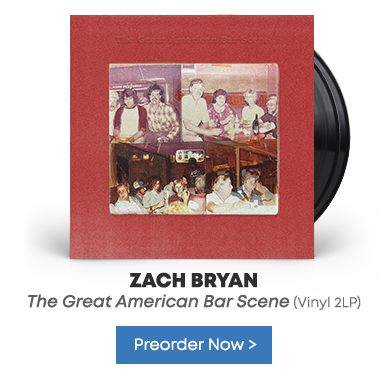It's no secret: Vinyl sales have been growing for more than 11 years. And in 2016, they reached a new historic high, with more than 13 million LPs sold, according to Nielsen Music, which tracks industry data. Plus, those numbers don't even take into account many independent retailers. We've finally reached a point where most artists again release their new works in analog – and with good reason, given the youngest listeners continue to embrace the format. Want hard evidence? Last year's top-selling LP belongs to Twenty One Pilots. Yet as any analog devotee will tell you, a multitude of key albums remain unavailable on vinyl – particularly records made after the CD became the preferred listening format. While everyone's list would likely be different, here are five great albums we hope to see on LP sooner rather than later.
Fiona Apple Tidal
In the summer of 1996, when alternative rock still counted as a dominating genre, a teenaged Fiona Apple released an album that scratched rather than screamed. Tidal introduced the world to an artist with bold pronouncements and an experimental streak. The work makes a statement before the first vocals are sung, beginning with the sort of rhythmic scrapes that sound as if they're trying to conjure a fire. Over the next 10 songs, Apple creates an aura of intimacy. In spite of the fragility of her piano playing and arrangements, she makes it clear that anyone who gets too close is likely to get burned. Some moments have a sinister, bluesy edge ("Shadowboxer"), and others walk a line between heartbreak and indifference ("Sullen Girl"). But the whole serves as evidence that the lessons of youth sting forever.
U2 Zooropa
U2 stands as the rare rock band that remains a powerhouse four decades into its career. Today, Bono and Co. are selling out stadiums with an upcoming tour that promises to revisit one of the act's 1980s highlights, The Joshua Tree. In the 90s, however, U2 became less concerned with rock anthems and got weird. Works like 1991's Achtung Baby and 1997's Pop embrace electronic and oddball textures. Yet Zooropa qualifies as the strangest of the lot, an album that nearly 25 years later still feels like a head-trip. What to make of the throbbing beats, spacey blasts, sing-speak vocals, and fuzzy, electrified guitars of "Numb"? Actually, maybe the guitars are really keyboards. Nothing is what it seems on Zooropa. Every verse, beat, and melody feels twisted, be it the falsetto euphoria of "Lemon" or lost-in-another-dimension landscape of "Daddy's Gonna Pay for Your Crashed Car." It all ends with an assist from Johnny Cash on the goofily haunted "The Wanderer."
The Muffs The Muffs
Punk went mainstream in the mid-90s, and the Muffs should've been at the top of the class. The long-standing Los Angeles quartet always featured a Ramones-like knack for a hook, but the sing-til-you're-hoarse vocal approach of Kim Shattuck gives even the most snarling songs a bouncy West Coast enthusiasm. Check the bratty stomp of the heavily sarcastic "Better Than Me," in which Shattuck celebrates her own faults while slamming a know-it-all bully. Or the shout-along "From Your Girl," where Shattuck demands a friend respect his significant other via 50s-inspired soda-pop zest – not to mention swaying harmonies and a lighthearted keyboard intro that references the sounds of India. Why? Maybe because just as East Coast punk was subway tight, the Muffs tapped into the suburban-like, sun-soaked sprawl of Los Angeles – an outdoor culture where even anger comes with a bit of zeal.
Frank Ocean Blonde
Blonde technically exists on vinyl, but you had to act fast. It was released on wax in 2016 for only 24 hours on the post-Thanksgiving shopping holiday known as Black Friday. So, if you're willing to get into an eBay bidding war, it can be had. Otherwise, you'll be stuck waiting on Ocean to change his mind. And it may be a while. The artist took four years to release the largely online-only sophomore effort in the first place. But like most everything with Ocean, the patience paid off. Blonde sits at the forefront of modern electronic R&B. Thoughts, ideas, and musical diversions drift in and out of low-key mood setters where acoustic guitars and softly humming keyboards remain in constant conversation. Ocean mixes themes – the record shifts from the topical to the personal and from the sensuous to the intellectual from verse to verse – and changes tones on nearly every song. Since his vocal approach is never the same, the collection feels like 17 individual chapters that require multiple readings.
Judas Priest Painkiller
There's mysticism here, a bit of comic-book imagery, and most importantly, clear suggestions of hope. On what may very well be Judas Priest's fastest, leanest, and meanest album, Painkiller – not coincidentally written and recorded shortly in advance of a well-publicized "subliminal messages" trial alleging the band culpable for the suicides of two young men – opens with an ode to a superhero. Considering we live in an age overrun with superhero stories – and, well, in a world desperately in need of real one – the title track of Priest's 1990 epic feels rather timely, like the hardest-rocking piece of wishful thinking ever created. Coming off a string of successful albums – mainstream-minded works that saw Priest achiever crossover success in the metal-hungry 80s – the terrifically heavy Painkiller drops any fluff and gets down to business. So long stadium choruses. Bye-bye slowed-down riffs. Background vocals come off as hellish choirs, guitars achieve as many tones as an 80-piece orchestra, and singer Rob Halford, on his last effort with the group before an extended hiatus, sounds possessed, especially when reaching for his feral, untamed falsetto.
16th Feb 2017




































